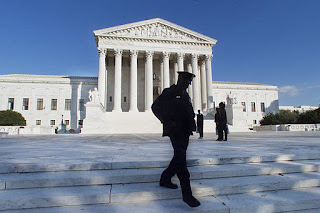
© 2008 Associated Press
Photo by Visar Kryeziu
by Michelle Halpern
The military’s independent newspaper, the Stars and Stripes, faced a restriction on free speech when Pentagon officials told the paper it couldn’t perform post-election coverage, wrote Dave Mazzarella on the Stars and Stripes website.
Writers for the paper were assigned to go to common areas on the military bases and cover the reactions of the election’s outcome as voting was being tallied by internet and television media. According to The New York Times, however, the Department of Defense barred reporters from doing so, stating that it wished to avoid “engaging in activities that could associate the Department with any partisan election,” since servicemembers in uniform can be seen as representing the opinions and viewpoints of the DoD.
Pentagon officials also stated that because commercial media were not being allowed to travel to military bases for election coverage, that Stars and Stripes should be held to the same standard. The Stars and Stripes argued that unlike commercial media, the paper has a unique purpose to provide news to troops in a way that is different from other forms of media because the paper’s staff works on site at the military base offices.
The DoD made clear that it was denying permission to conduct post-election coverage not only in the paper’s Pacific sector, but worldwide.
In disregard to the Office of the Secretary of Defense for Public Affairs’ (OSDPA) restriction, Editorial Director Terry Leonard told reporters to go forward with the election coverage on the big night. Reporters were advised by Leonard to respond peacefully if asked to leave the base common areas by authorities.
According to the Stars and Stripes website, only three bases in the end faced issues with the Pentagon’s ban--one in Japan and two in South Korea. The paper has not run into any conflict regarding the issue since election night, but staffers remain concerned about the precedent that this ban might set for future political speech.































